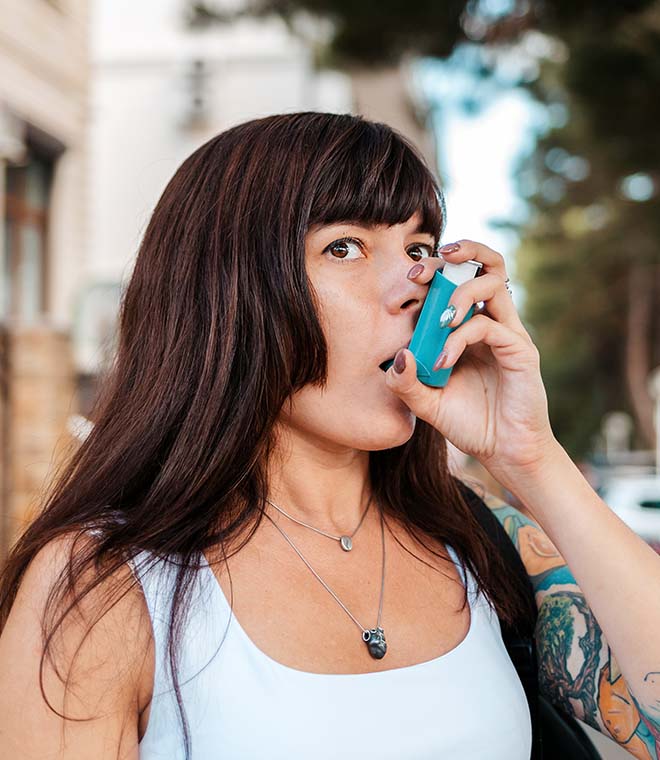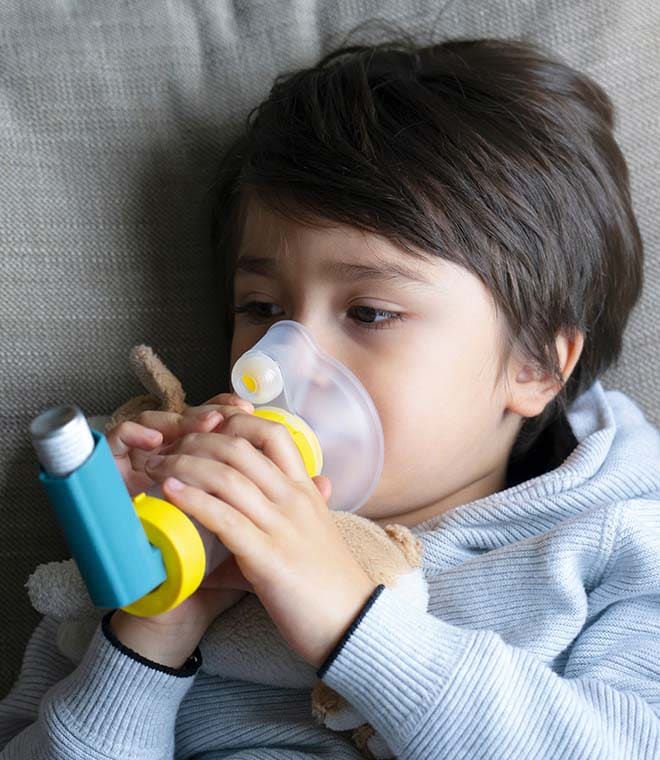Health
What are the symptoms of asthma?
By Sanjay “Jay” Patel, DO, Allergy & Immunology May 06, 2025 • 6 min
Asthma affects over 28 million (about 1 in 12) people in the U.S. It’s a condition that can develop in both kids and adults. Being familiar with the signs of asthma can help you determine whether you need to see your healthcare provider.
What is asthma?
Asthma is a chronic respiratory condition that affects the lungs. When you breathe in, air travels through passages called airways into your lungs. This is where oxygen is transferred into your blood so that it can be carried to vital organs such as your liver, kidneys and brain. Your lungs also remove carbon dioxide from your blood, expelling it from your body when you exhale.
In people with asthma, the airways become inflamed, and the muscles that control the airways can tighten up. This swelling and constriction causes the passages to become more narrow, making it difficult for air to pass through. Difficulty breathing is the primary symptom of asthma.
There are many types of asthma, with severity ranging from mild to severe. Allergic asthma occurs when people encounter proteins they’re sensitive to called allergens. Other types of asthma are caused by immune cells and can cause symptoms regardless of environmental triggers. People may also experience asthma symptoms during exercise, illness, stress, exposure to irritating substances and other lung conditions such as chronic obstructive pulmonary disease (COPD).
What are asthma symptoms?
Asthma can be persistent or intermittent. With intermittent asthma, you experience symptom flare-ups that resolve over time, leaving you breathing normally again. Persistent asthma means that you have symptoms more often than not. However, the severity may fluctuate. Symptoms of both types of asthma include:
- Chest discomfort: Due to inflammation of their airways, people with asthma may experience discomfort in the chest area. Your chest may feel tight, like someone is squeezing it. You may also feel pressure in your chest. In some cases, asthma causes acute chest pain.
- Coughing: Asthma can cause coughing. An asthma-related cough is usually dry, which means it doesn’t produce sputum. Less often, people with asthma may have a “wet cough,” which produces sputum. A cough with asthma may worsen at night or when you develop a respiratory virus like the flu or the common cold.
- Shortness of breath: Difficulty breathing is a common symptom of asthma. You may feel as if you can’t take a full breath or catch your breath. This symptom occurs because air can’t move out of the lungs as easily due to inflammation and constriction.
- Wheezing: With the airways constricted, air may make sounds as it moves in and out of the lungs. You may be able to hear a wheezing or whistling sound as you breathe in and out.
- Sleep problems: Coughing, wheezing, chest discomfort and shortness of breath can negatively impact sleep. People with asthma may wake up frequently, find it difficult to sleep through the night or struggle to fall asleep.
What are asthma attacks?
Asthma symptoms may be severe and occur suddenly. People commonly refer to this as having an asthma attack. It happens when the airways constrict rapidly. Untreated, severe asthma attacks can be life-threatening. In fact, up to 10 people in the United States die from asthma each day.
Asthma attack symptoms are similar to those of asthma and include chest pain and tightness, coughing, wheezing, and shortness of breath. However, the intensity of symptoms is more severe, and symptoms may not respond to the treatments that you normally use to control your asthma on a daily basis. If you experience any of the following symptoms during an asthma attack, seek emergency medical attention:
- Inability to speak due to shortness of breath
- Having to strain your chest in order to breathe
- Severe wheezing
It’s also important to seek medical attention if there’s no improvement after using a rescue inhaler.
How is asthma treated?
Asthma treatment typically includes identifying your asthma triggers and taking steps to manage them. Inhalers, nebulizers and oral medications are often prescribed to provide relief during a flare-up as well as daily management of your asthma to prevent frequent flare-ups. Your healthcare provider can show you how to use an inhaler properly. Incorrect technique is commonly to blame when asthma symptoms don’t improve after using this type of treatment. If your asthma doesn’t improve with the use of an inhaler despite using proper technique, your healthcare provider may recommend other treatments.
Updated by Rebeca Thomas, RN, BSN, May 2025.
Sources:
- https://www.mayoclinic.org/diseases-conditions/asthma-attack/symptoms-causes/syc-20354268
- https://my.clevelandclinic.org/health/diseases/6424-asthma
- https://acaai.org/asthma/symptoms/asthma-cough/
- https://aafa.org/asthma/asthma-facts/
- https://www.mayoclinic.org/diseases-conditions/asthma/symptoms-causes/syc-20369653
- https://medlineplus.gov/asthma.html
- https://www.nhlbi.nih.gov/health/asthma/symptoms
- https://www.nhlbi.nih.gov/health/lungs
- https://www.epa.gov/asthma/what-asthma-symptom-episode-or-attack
- https://www.nhlbi.nih.gov/health/asthma



